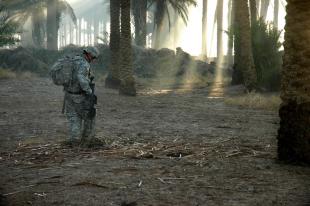 The Foreign Minister of Iraq, Hoshyar Zebari, has written a heart-felt pieces in today's Washington Times pleading for the world not abandon them:
The Foreign Minister of Iraq, Hoshyar Zebari, has written a heart-felt pieces in today's Washington Times pleading for the world not abandon them:Last weekend a traffic jam several miles long snaked out of the Mansour district in western Baghdad. The delay stemmed not from a car bomb closing the road but from a queue to enter the city's central amusement park. The line became so long some families left their cars and walked to enjoy picnics, fairground rides and soccer, the Iraqi national obsession.
Across the city, restaurants are slowly filling and shops are reopening. The streets are busy. Iraqis are not cowering indoors. The appalling death tolls from suicide attacks are often high because of crowding at markets. These days you are as likely to hear complaints about traffic congestion as about the security situation....
So why should the world remain engaged in Iraq?
The Baghdad security plan was conceived to give us breathing space to expedite political and economic development by "securing and holding" neighborhoods across the capital. There is no quick fix, but there have been real results: Winning public confidence has led to a spike in intelligence, a disruption of terrorist networks and the capture of key leaders, as well as the discovery of weapons caches. In Anbar province, Sunni sheikhs and insurgents have turned against al-Qaeda and to the side of Iraqi security forces. This would have been unthinkable even six months ago....
Contrary to popular belief, most government ministries are located outside the Green Zone, and employees drive to work every day despite death threats and attacks on colleagues and families. We government ministers are always at risk of assassination. When a suicide bomber attacked parliament last month, the legislators sat in defiance in an extraordinary session the following day. I am particularly inspired by the commitment of the young diplomats in the Foreign Ministry, a diverse mix of Sunni, Shiite, Christian, Arab and Kurdish men and women who serve their country without subscribing to religious or sectarian divisions.
Only with continued international commitment and deeper engagement from our neighbors can we establish a stable democratic, federal and united Iraq. The world should not abandon us.
2 comments:
Wow, a Washington Times op-ed completely detached from reality. How interesting. Lost my good faith as a reader when traffic congestion was named a problem to rival the "secutiry situation." Nice euphemism!
Seriously, though, these "hard-won democratic acheivements" are looking worse for the wear by the day. Do you really think the role of U.S. forces should be to prop up a unstable regime that doesn't share our interests and has no popular support in Iraq? Really?
I'm not sure if those questions are rhetorical or for me. My feelings on the current surge are mixed: I believe that we have a moral obligation to try and provide security in Iraq, both to its citizens and our soldiers. I pray that we'll be successful. On the other hand, I believe the administration to be so incompetent and detached from reality that my faith in their ability to do so is left wanting. Essentially, the surge seems to be too little too late. Still I'm willing to give it a few more months before I believe redeployment is the correct thing to do.
Post a Comment